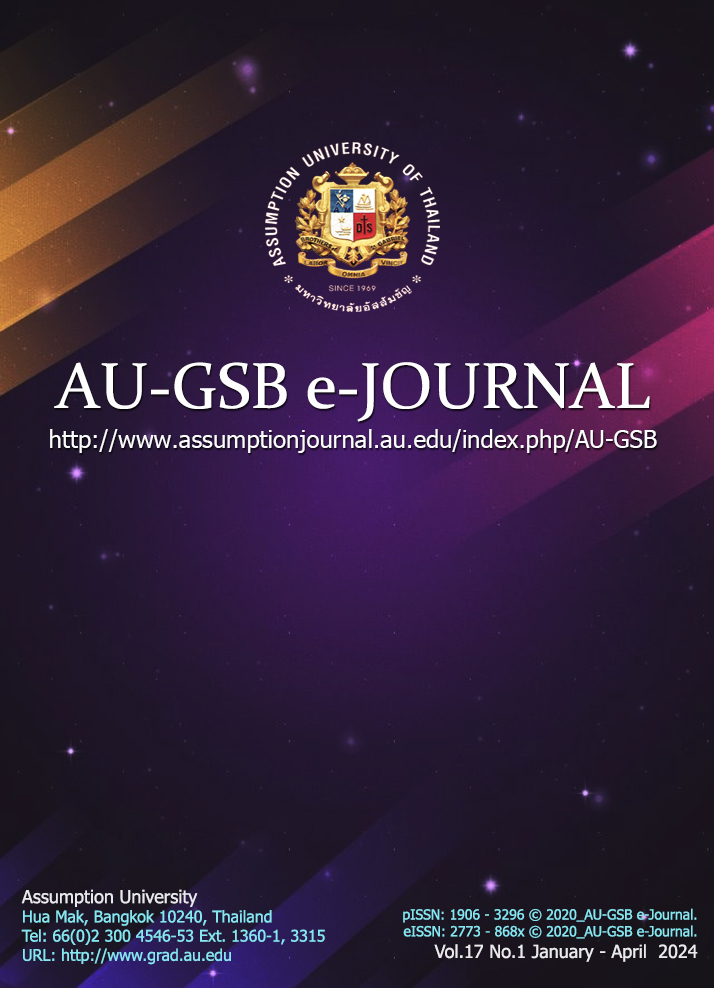Tourists' Accommodation Choices Based on Sustainable Practices of Budget Hotels in Bangkok
Main Article Content
Abstract
Purpose: Tourism is one of the most important economic activities in the world, and the accommodation sector is a significant component of the industry. Tourists have become more concerned about the impact of their travel on the environment and society. Therefore, sustainable practices in the accommodation sector have become an important aspect of the decision-making process of tourists when choosing accommodation. The study aims to understand the factors affecting tourist choice of accommodation towards sustainable practices, using a budget hotel in Bangkok as a case study. It also explores how the hotel's implementation of sustainable practices, such as energy and water conservation, waste management, and social and environmental responsibility, affects tourists’ perceptions and decisions to stay at the budget hotel in Bangkok of Thailand. Research design, data and methodology: The data were collected by qualitative methods through face-to-face-in-depth interviews. The constant comparison technique with labeling, open and axial coding was used to analyze the data. Through the study, it was found that hotel management plays a significant role in promoting sustainable practices and influencing tourists’ choice of accommodation. Effectively communicate their sustainability practices and engage guests in eco-friendly activities receiving more positive feedback from tourists in Budget Hotel. Furthermore, budget hotels that prioritize staff training and education on sustainability practices were perceived as more credible and trustworthy.
Downloads
Article Details

This work is licensed under a Creative Commons Attribution 4.0 International License.
The submitting author warrants that the submission is original and that she/he is the author of the submission together with the named co-authors; to the extend the submission incorporates text passages, figures, data, or other material from the work of others, the submitting author has obtained any necessary permission.
Articles in this journal are published under the Creative Commons Attribution License (CC-BY What does this mean?). This is to get more legal certainty about what readers can do with published articles, and thus a wider dissemination and archiving, which in turn makes publishing with this journal more valuable for you, the authors.
References
Bansal, H. S., & Taylor, S. F. (2014). The Role of Sustainability in hotel popularity and Profitability. Journal of Hospitality & Tourism Research, 38(2), 172-191. https://doi.org/10.1177/1096348011426158
Berezan, O., Yoo, M., & Han, H. (2016). Understanding tourists’ pro-environmental behavior in sustainable tourism: A model of goal-directed behavior. Tourism Management, 52, 460-471.
WTTC. (2021, June). Global Economic Impact and Trends 2021. https://wttc.org.
Gossling, S., & Scott, D. (2010). Sustainable tourism in destinations: A review of key themes. Tourism Management, 31(2), 175-182. https://doi.org/10.1016/j.tourman.2009.05.005
Kim, S. S., & Lee, C. K. (2011). Ecotourists' perceptions of environmentally responsible accommodations. Journal of Travel Research, 50(4), 435-451. https://doi.org/10.1177/0047287510362770
Kim, Y., & Lee, J. (2011). The Effect of Environmental Attitudes on Tourist Choice of Accommodation. Tourism Management, 32, 647-656. https://doi.org/10.1016/j.tourman.2010.06.003
Zhang, X., & Wang, D. (2017). Sustainable Practices in the Hospitality Industry: An Analysis of Consumer Awareness and Perception. Journal of Sustainable Perception. Journal of Sustainable Tourism, 25, 247-257. https://doi.org/10.1080/09669582.2017.1288496
